Newsletter #009 - Glückliches und bedeutungsvolles Leben
Bisher haben wir Effizienz und Effektivität im Kontext von Lernen, Jobsuche und Meetings betrachtet und festgestellt, es braucht einen Nordstern oder eine Vision, damit unser Tun einen Sinn ergibt. Meine Antwort darauf ist das Streben nach einem glücklichen und bedeutungsvollen Leben. Lass uns in das Thema eintauchen.

Im fünften Teil der Serie "Wissen in Bildern" werde ich dir meine Sicht auf das Thema glückliches und bedeutungsvolles Lebens zeigen. Ich werde einige Erkenntnisse auflisten, die ich in den sozialen Medien gefunden habe. Hoffentlich bist du am Ende des Artikels einen Schritt weiter auf der Suche nach Antworten für ein glückliches und bedeutungsvolles Leben.
Meine Sichtweise auf das Thema
Bis ich an den Punkt gekommen bin, mir diese große Frage nach dem Sinn des Lebens zu stellen, war bereits ein viertel Jahrhundert vergangen. Nach diesen 25 Jahren habe ich mir die Frage nicht bewusst gestellt, sondern unbewusst zu suchen begonnen. Damals wie heute habe ich Bücher als meine Wissensquelle genutzt. Die unbewusste Suche hatte den Fokus auf der Anhäufung von Wissenskapital, um mir eine stabile Grundlage für meinen Erfolg zu schaffen. Zu dem Zeitpunkt habe ich Erfolg nicht definiert, sondern nach einer schwammigen Erwartung aus meiner Sozialisierung gestrebt. Rückblickend würde ich sagen, dass sich Erfolg für mich wie folgt definiert hat: ein Haus, eine Familie mit zwei Kindern und kein Chef – also eine eigene Firma.
Heute, fast ein weiteres viertel Jahrhundert später, hat sich meine Perspektive dank der richtigen Bücher verändert: Ich habe die richtigen Fragen für mich gefunden und feile an einer bewussten Definition von Erfolg. Und diese Definition ist eng verknüpft mit dem Thema Ruhestand und was ich vom Leben erwarte.
Rückblickend werde ich mein Leben als erfolgreich betrachten, wenn meine Bestrebungen bedeutungsvoll sind und ich bei meinem Tun glücklich war.
Dieser Ansatz birgt für mich zwei wundervolle Vorteile. Zum einen ist die Definition so schwammig, dass ich so ziemlich alles tun kann. Ich bin nicht eingeschränkt; ich bin frei zu entscheiden, wobei ich Glück empfinde; ich entscheide, was für mich bedeutend ist. Zum anderen entscheide ich und nicht jemand anders für mich. Oder die Meinung anderer. Damit bin ich unabhängig (was ich ja immer sein wollte) und nur mir selbst Rechenschaft schuldig.
Die nachfolgende Grafik veranschaulicht die Entwicklung meiner Sichtweise als Softwareentwickler:
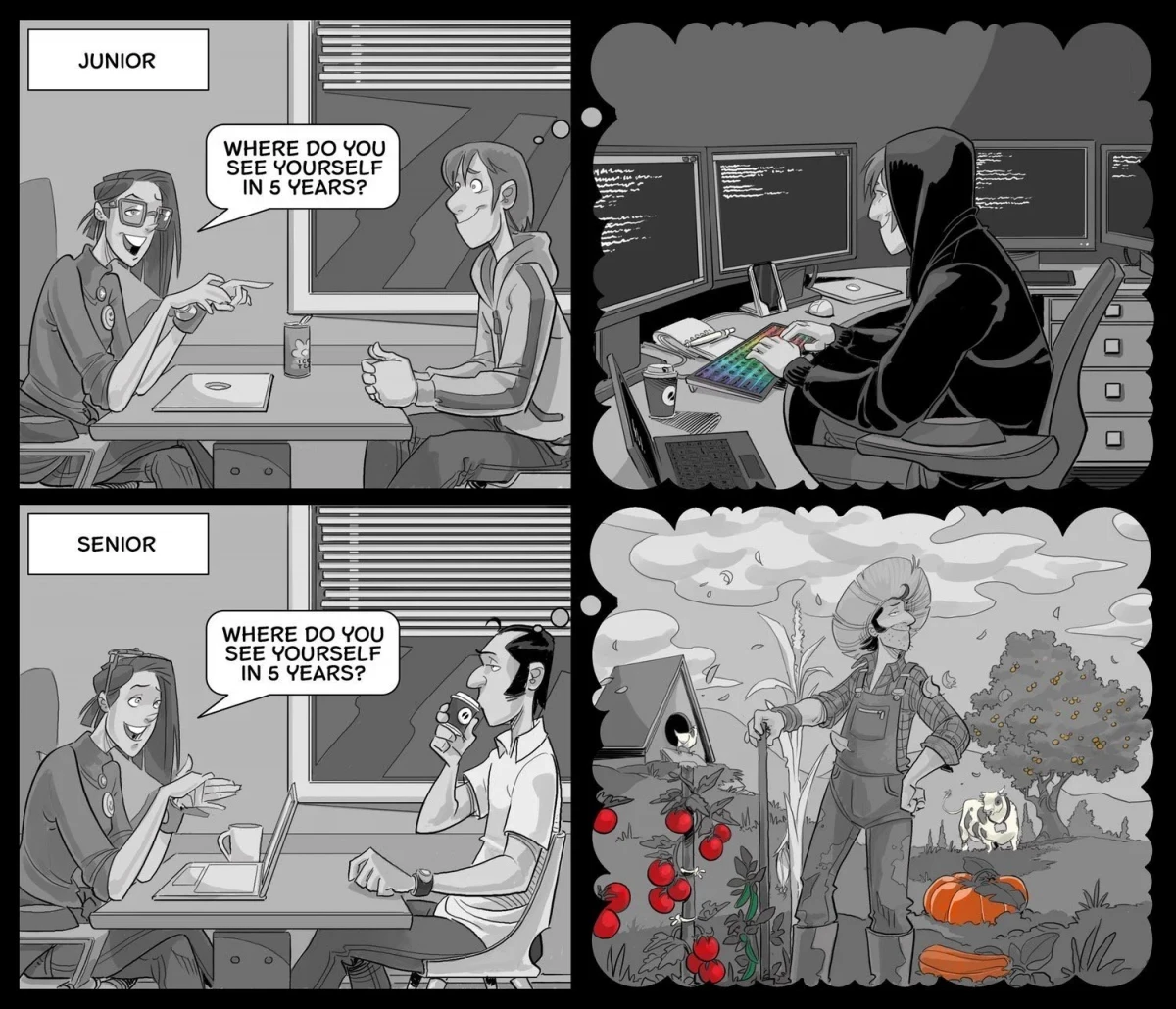
Zwischen den beiden Momenten liegen etliche Jahre, in denen ich Artikel gelesen, Bücher gewälzt und Dinge ausprobiert habe. In diesem Beitrag zeige ich die Grafiken mit den interessantesten Denkanstößen zu dem Thema Glücklichsein, in der Hoffnung, dass sie dich inspirieren und weiterbringen.
Wie denkst du darüber?
Setzt du dir Ziele und verfolgst sie konsequent oder lässt du Dinge zu und genießt, was das Leben dir bietet?
Erzähl mir von deinen GedankenDenkanstöße zum Glücklich sein
Der Unterschied von Reichtum und Wohlstand
Für viele Menschen ist Erfolg mit Geld und Reichtum eng verknüpft – zumindest war es mit Anfang zwanzig bei mir. Als meine Kinder das Licht der Welt erblickt haben, reifte in mir die Erkenntnis, dass Geld hilft, jedoch eines nicht rückwirkend erkaufen kann: (Qualitäts-)Zeit. Mir hat sich offenbart, dass mein Investment in den Job (aka Erfolg bzw. Karriere) in einem direkten Konflikt mit der Zeit steht, die ich mit meiner Familie verbringen kann. Dieser Konflikt war vor den Kindern schon vorhanden: Verbringe ich Zeit mit meinen Freunden, lese, lerne und schaffe mir irgendwie wundervolle Erinnerungen oder gebe ich dem Geldverdienen den Fokus?
Die nachfolgende Grafik verdeutlicht den Konflikt. Wenn der Fokus auf nur einem Punkt liegt, leiden zwangsläufig die anderen Aspekte. Im Falle von Geld bzw. Reichtum vernachlässige ich Familie oder Freundschaften.

Eines muss sich jede:r bewusst machen: Wenn wir im Sterbebett liegen und uns zurückerinnern, erinnern wir uns nicht an die wundervollen Überstunden, die wir zum Wohle der Karriere und dem Geld investiert haben. Sollte der Gedanke ans Sterbebett zu abstrakt oder weit weg sein: Denk an die letzte Woche, den letzten Monat oder das letzte Jahr zurück – an welche Momente erinnerst du dich? Wenn Aspekte der Arbeit dabei sind, sind es die Überstunden oder der eigentlich "nur" der besondere Moment, als du aus der Komfortzone entflohen und über dich hinausgewachsen bist?
Aspekte, die Erfolg definieren können
Sobald das Verständnis dafür gereift ist, dass Erfolg mehr als Jobtitel und Gehalt ist, folgt die Überlegung: Was will ich? Was ist mir wichtig? Die Antwort ist individuell. Jedoch ist allen gemein, dass Glücklichsein meiner Meinung nach nur funktioniert, wenn ich die Antwort auf diese Fragen kenne. Meiner Meinung nach muss die Antwort heute nicht die gleiche wie morgen sein. Das Leben und die Lebenssituation verändern sich und damit die Antwort – das ist ok und sollten wir zulassen.
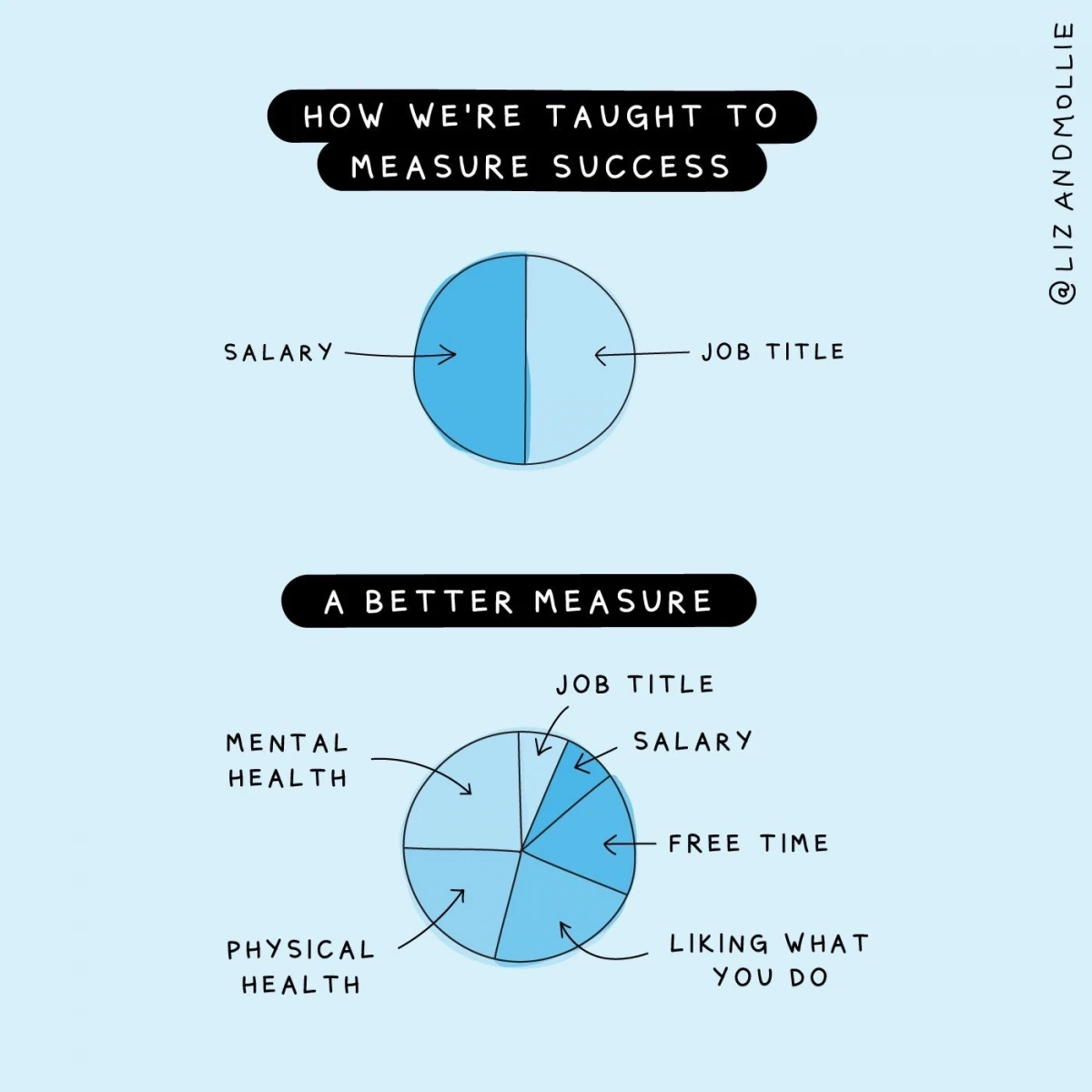
An dem Tortendiagramm finde ich es gelungen, dass es dem Begriff Gesundheit fast 50 % zuschreibt – verteilt auf körperliche und geistige Gesundheit. Ob dies absichtlich erfolgt ist, weiß ich nicht. Nur trifft es den Punkt: bin ich gesund, kann ich darauf aufbauen und mich verwirklichen.
Glücksgefühle – die Dopaminfalle
Die Herausforderungen, die sich aus dem modernen Alltag ergeben, sind vielen bekannt. Trotzdem kann nicht oft genug betont werden, welche fatalen Folgen die smarten Geräte bzw. die Applikationen auf uns und unsere Gesundheit haben. In meiner Buchreview "Make Time" habe ich über die magische Art und Weise philosophiert, in der bei einem Hauch von Langeweile plötzlich das Handy in der Hand ist. Der Grund dafür ist die Dopaminfalle.
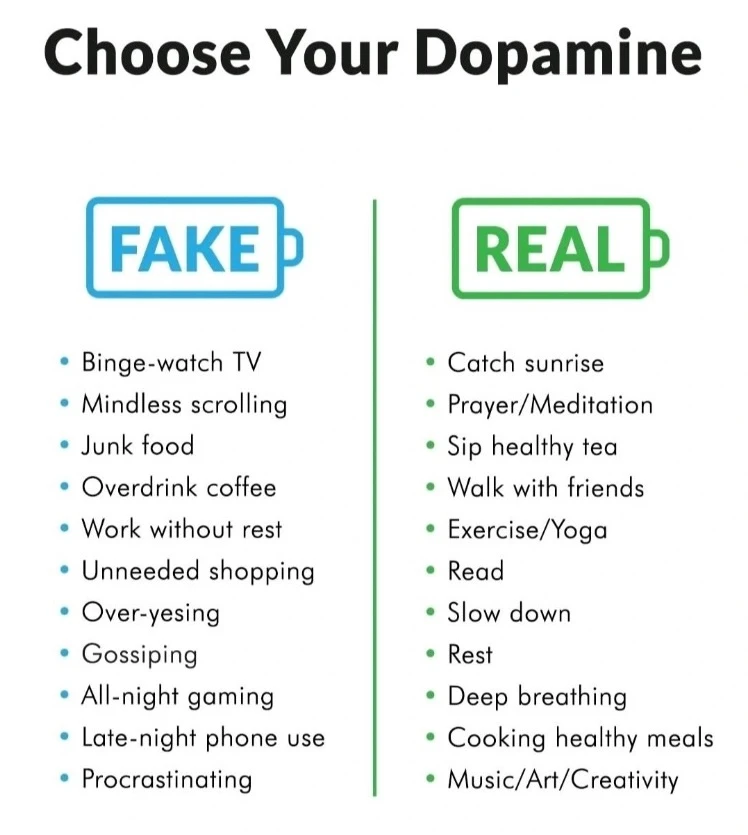
Es gibt weitere Angewohnheiten, die ähnlich fatal wirken und nicht bei allen auf dem Radar sind, weswegen ich diese Grafik eingefügt habe. Diese elf Punkte in einem ruhigen Moment durchzugehen und sich ehrlich zu fragen, wie oft bin ich unbewusst (im Autopiloten) auf der Fake-Seite? Meine Betonung liegt auf dem Wort unbewusst! Bei mir steht All-night Gaming ganz weit oben. Das plane ich gezielt an freien Wochenenden zusammen mit meinem Sohn: PS5 zocken bis in die Nacht.
Wege zum Glücklichsein
Pauschalisieren ist stets gefährlich. Deshalb betrachtet die kommende Auflistung mit Vorsicht und überlegt, was für euch zutreffend ist. Gleichzeitig gibt es Erkenntnisse zu einer Handvoll Angewohnheiten, die über kurz oder lang dazu führen, dass Glücklichsein schwerer fällt, als wenn wir die Angewohnheiten gegen die aktiveren und achtsamen Varianten tauschen. Diese Erkenntnisse sind in der nachfolgenden Übersicht gegenübergestellt.
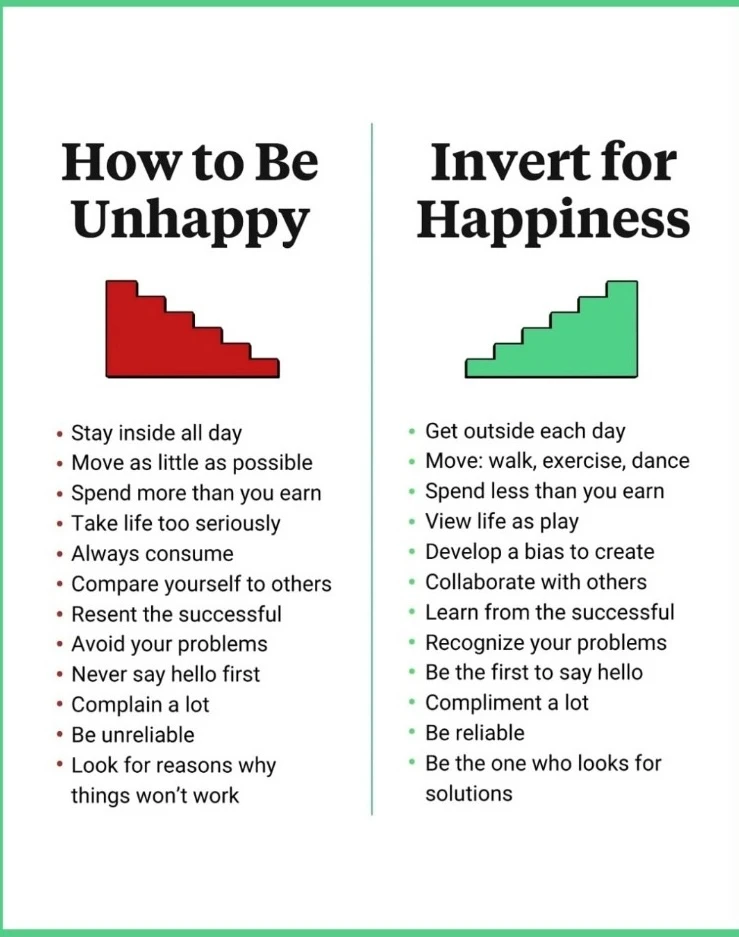
Im Kern steckt für mich darin, eine positive Einstellung zu haben. Dass ich mich von eigenen oder fremden Bedenken nicht einschränken lasse und sogenannten Realisten (aka. Bedenkenträger) ignoriere. Hierzu kann ich das Buch "Denken Sie groß" von David J. Schwartz empfehlen – mehr Details in meiner Buchreview.
Fazit
Um das Thema zusammenzufassen, braucht es natürlich noch eine Studie aus Harvard. Oder genauer gesagt, eine Übersicht der Erkenntnisse, die die Befragung älterer Menschen ergeben hat. Nach den vielen Informationen bis hier sind die acht Aspekte keine Überraschung, sondern eine sinnvolle Zusammenfassung, die ich euch nicht vorenthalten möchte:
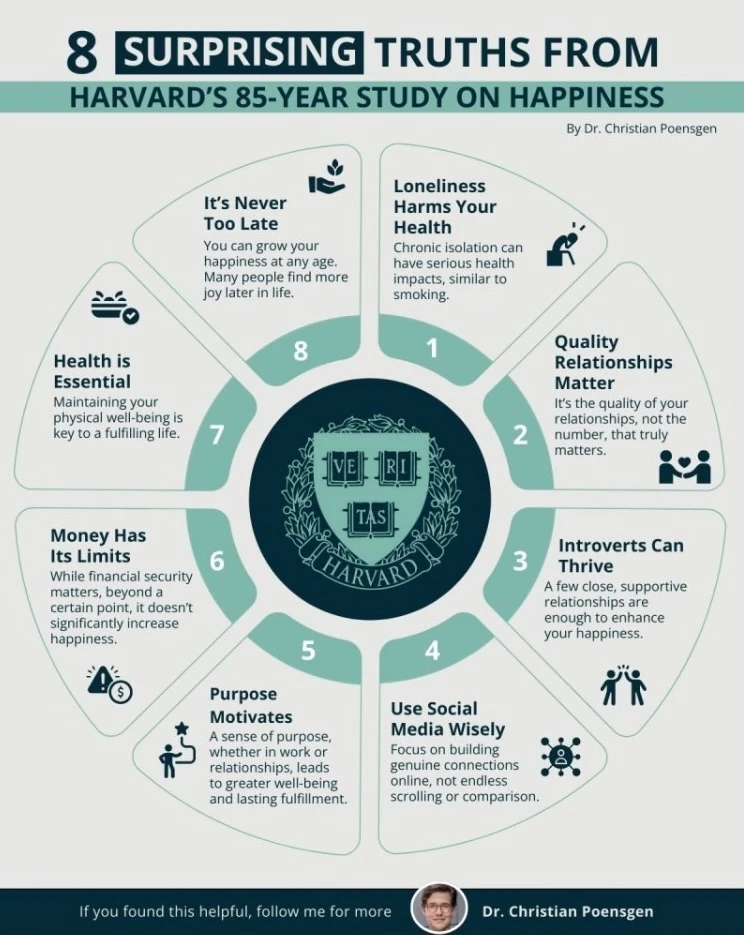
Ein wesentlicher Aspekt, den ich in der bisherigen Ausführung offen gelassen habe, reiche ich als Bonusmaterial an dieser Stelle nach. Die Grafiken zeigen gute Wege zum glücklichen Leben, nur nicht zum bedeutungsvollen. Das wird maximal gestreift. Also wenden wir uns den spannenden Fragen zu, die wir uns selbst stellen müssen, um zu erkennen, was bedeutungsvoll für jede:n Einzelnen ist.
Bonusmaterial
Bis hierhin haben wir Wege besprochen, die zum Glücklichsein helfen und verdeutlicht, dass Bedeutung, Sinn oder Passion wichtig sind – nur wie soll ich die finden? Die dafür hilfreichen Fragen kommen hier:
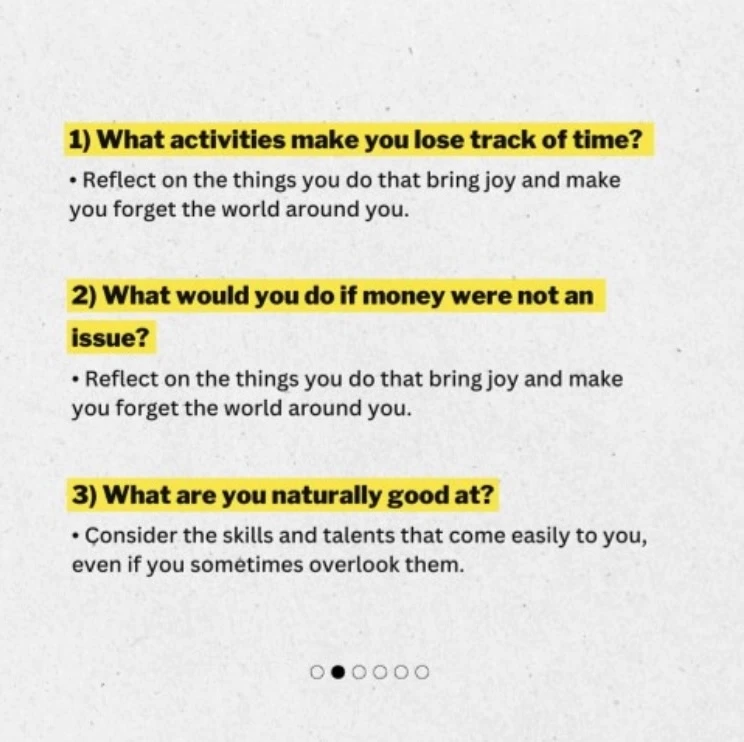
Die ersten drei Fragen richten sich darauf, was wir mögen, können und wollen. Beim Wollen blenden wir bewusst die Grenze des finanziell möglichen aus, um auf den Kern unserer Wünsche zu gelangen.
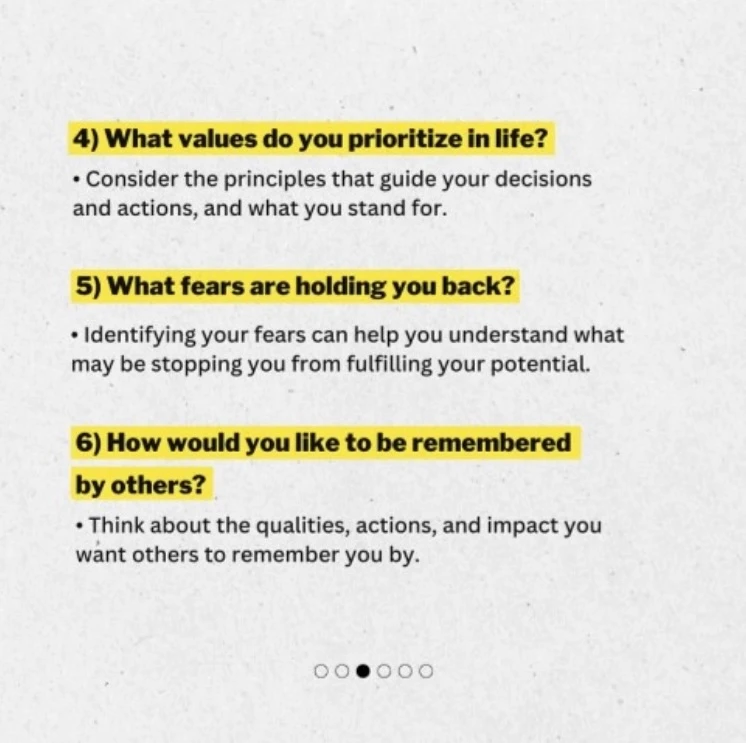
Bei den nächsten drei Fragen schaffen wir Bewusstsein für unsere Werte und Ängste. Darauf aufbauend wendet die sechste Frage den kleinen psychologischen Trick an, uns selbst aus den Augen anderer zu betrachten.
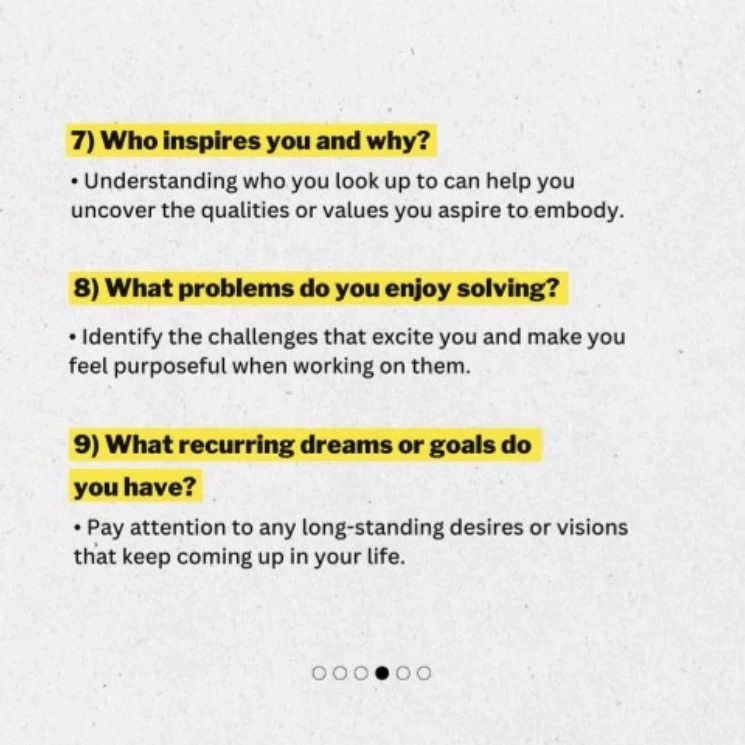
Die siebte Frage nach den Vorbildern ergänze ich für mich um die Frage nach den Leuchttürmen. Das sind Personen bzw. Eigenschaften bestimmter Personen, die wie ein Leuchtturm sind: Sie warnen mich – genauso will ich nicht sein.
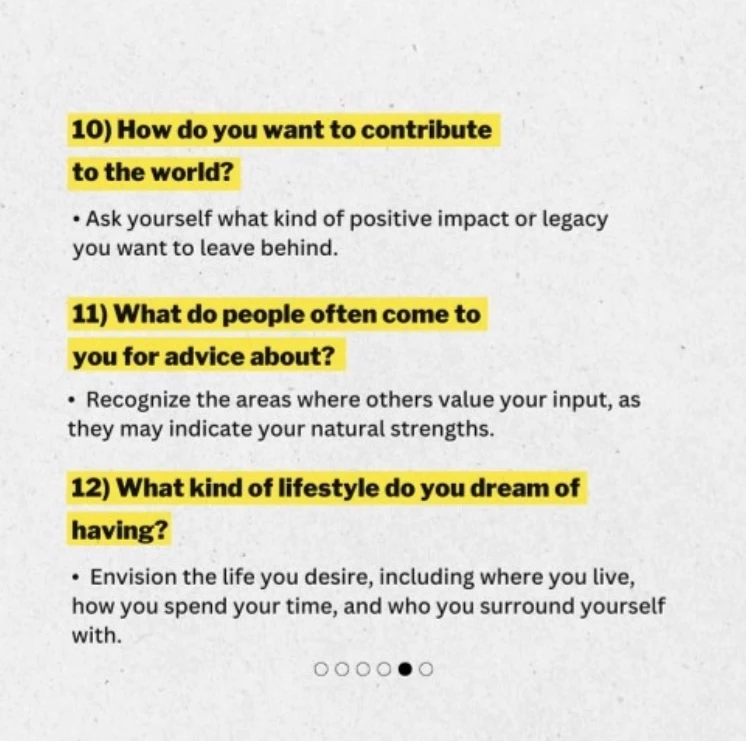
Die letzten drei Fragen richten die Aufmerksamkeit nach außen. Sie zielen darauf ab zu verstehen, was wir der Welt zurückgeben können, wie wir anderen helfen oder mit wem wir uns umgeben (wollen). Die Wichtigkeit solcher Fragen möchte ich mit einem Zitat unterstreichen, das Ende der Achtziger aufkam:
Wenn jeder an sich denkt, ist an alle gedacht
Diese Redensart ist angelehnt an die Theorien von Adam Smith, basiert auf Egoismus und verdeutlicht die gesellschaftliche Verrohung. Ich möchte den Fokus auf den relevanten Aspekt lenken: Nachdem ich für mich selbst gesorgt habe, bin ich in der Lage, anderen zu helfen – und sollte dies gefälligst auch tun.
Konntest du etwas mitnehmen?
Hat sich deine Meinung zu dem Thema verändert? Stimmst du den Gedanken zu oder bist du anderer Meinung?
Lass uns dazu austauschenAusblick
Wir wissen jetzt, dass sich Produktivität und Glücklichsein nicht ausschließen. Sie fußen beide auf demselben Fundament: unsere selbstdefinierte Bedeutung. Auf unserem Weg stellen wir uns viele und kritische Fragen, beschäftigen uns mit den Antworten und beginnen von vorne.
Ich tendiere dazu, zu viel nachzudenken, was im Englischen mit dem Wort "Overthinking" passend umschrieben wird. In dem Begriff ist ein Aspekt enthalten, den ich hervorheben will: Bei diesem Phänomen besteht die Gefahr, dass wir uns mit einer Flut negativer Gedanken plagen. Bevor dies obsessiv wird, gilt es gegenzusteuern. Dazu gibt es in Japan acht Techniken, denen wir im nächsten Newsletter Mitte Juni widmen.
Vielen Dank, dass du meinen Newsletter liest.
All the best – Mark